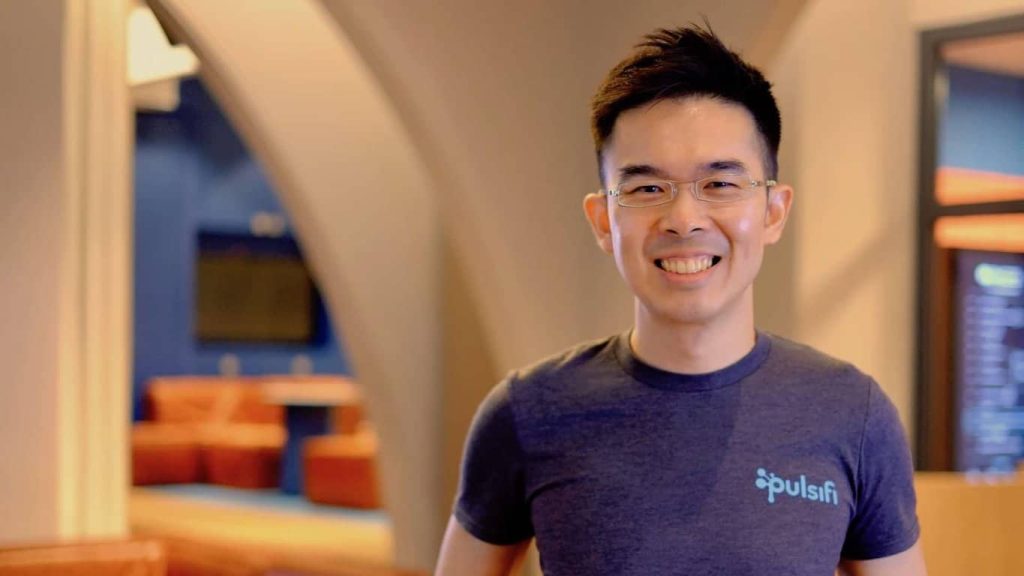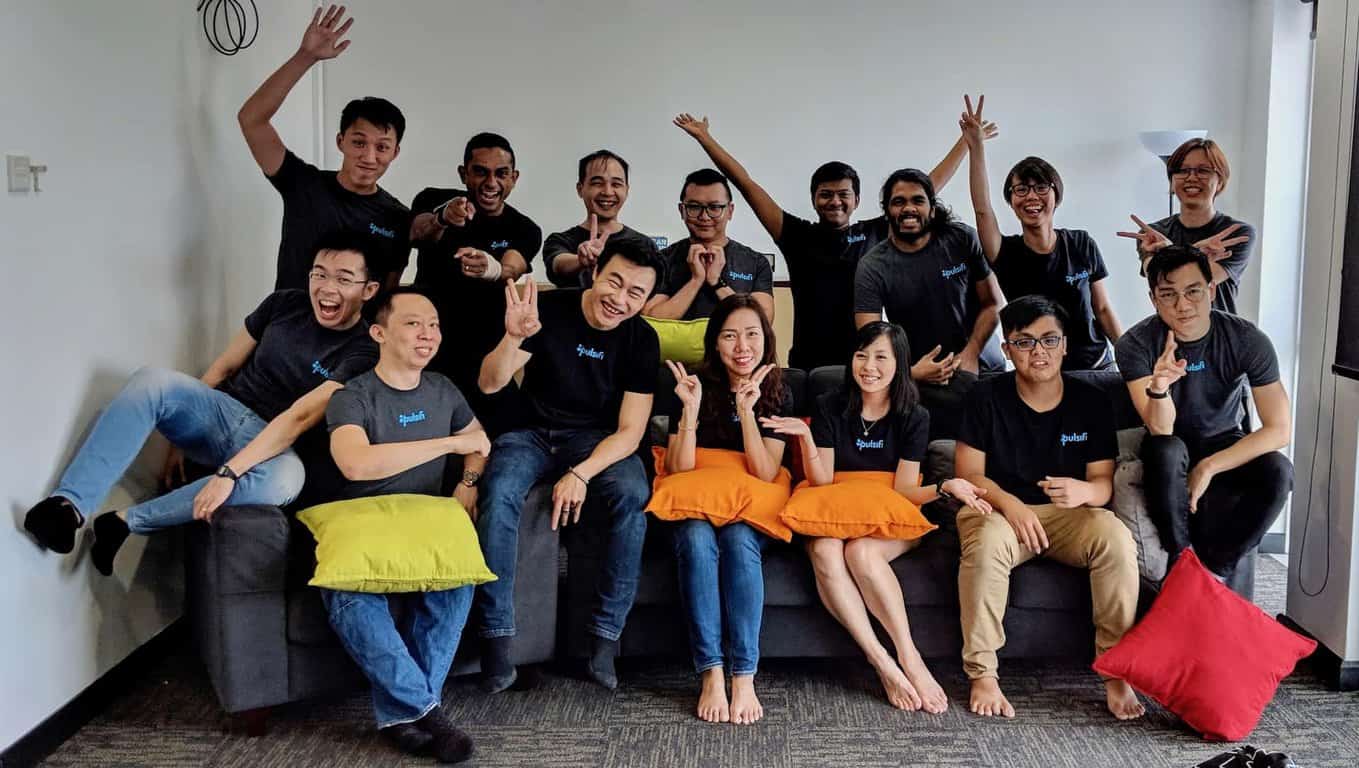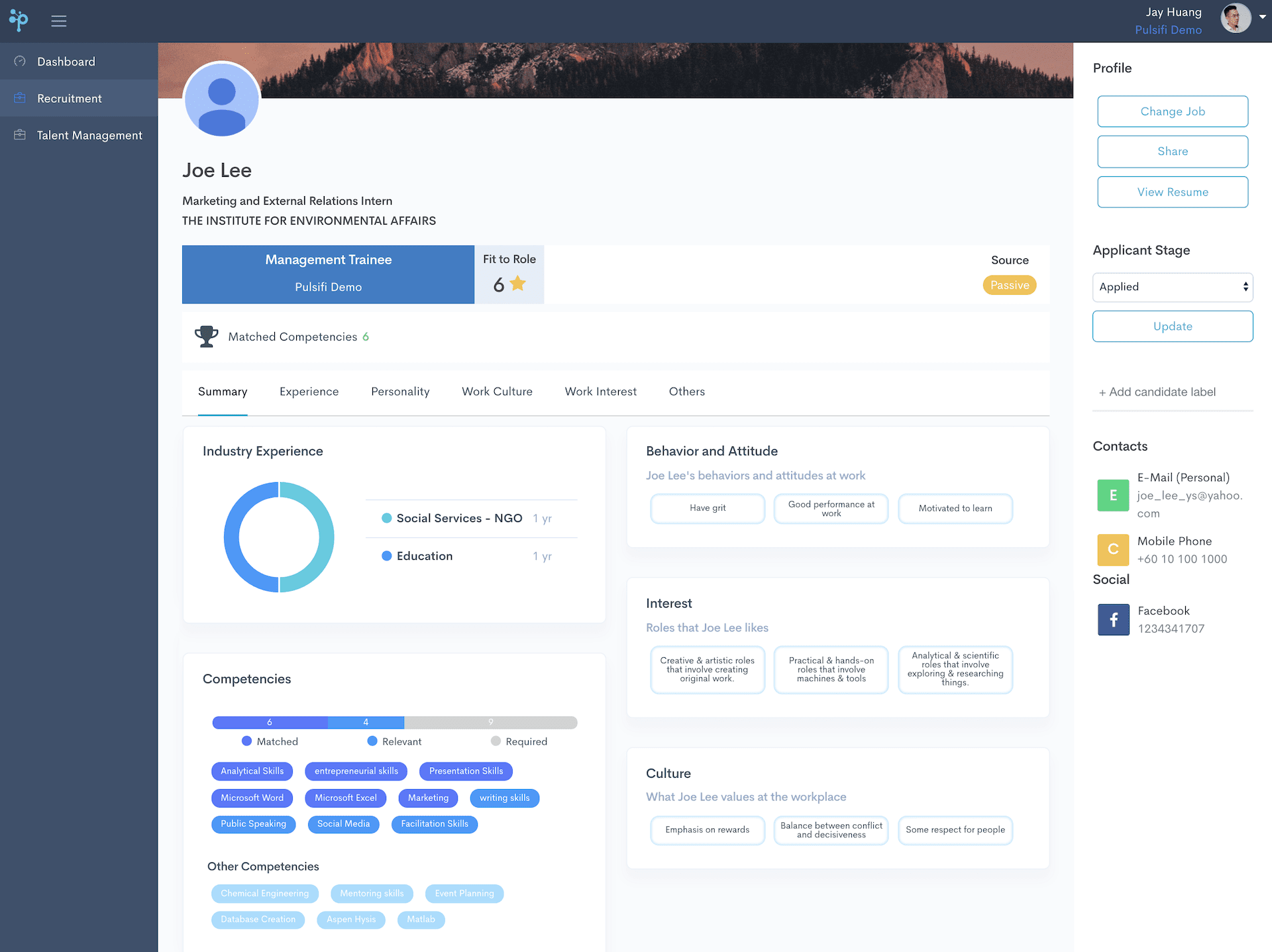Quick Word: Jay Huang, CEO and Co-Founder of Pulsifi
Jay believes that building a great team is key to a successful business.

In SBO Quick Word, business owners and professionals share with us a slice of their industry, business and life over a quick email interview.
We read somewhere that you used to be part of the public service. Why the career change?
I started my career with the Singapore government. It was very inspiring and meaningful working with the passionate people in the public service, who go all out to help the people and companies of Singapore.
Many years later, I co-founded Pulsifi to create a platform leveraging technology that can achieve impact at greater scale – to help people around the world realise their potential in their careers, and help organisations improve how they make people decisions.
Was the transition from public service to an entrepreneur challenging?
… transitioning to the entrepreneur mindset required a big change in decision priorities…
The considerations of a public servant and entrepreneur are definitely two extreme ends of the spectrum! Profit and loss (P&L) is not the biggest concern of the government agency, and of course even less so for its employees, which allows the flexibility to do public good. On the other hand, P&L and cash flow are huge concerns for the entrepreneur who needs to ensure that the business stays afloat and that team members are paid their salaries.
For me, transitioning to the entrepreneur mindset required a big change in decision priorities, but it happened very quickly. The focus on business viability actually helps our team prioritise where we really deliver value so that we can put our resources where the impact is maximised and most appreciated.
What was the greatest challenge that you faced in the early stages of Pulsifi?
Building a strong team! When we were hiring for early roles like data science and software engineering, besides specific skills, we looked for soft traits like passion for the role and cultural fit. Understanding each person beyond their CV, and identifying people with the desired traits were not easy. Now imagine doing that for tens or hundreds of candidates!
We found building the team harder than challenges like raising funds from investors or convincing early clients.
We found building the team harder than challenges like raising funds from investors or convincing early clients. But this is not surprising. Most organisations, regardless of whether they are early-stage or established, would cite people as their biggest challenge – but also their biggest asset. And [those factors are] why Pulsifi was founded!

How did you overcome that challenge?
First, we had to establish what we really needed for each role.
For technical roles, for example, do we need expertise in certain programming languages? We realised that what really matters was not existing expertise, but the motivation and ability to learn and master programming languages. Someone can be an expert today, but might not be able to adapt for tomorrow.
For client-facing roles, do we look for people who are outgoing and natural talkers? We realised that we needed people who are warm, who clients will like as people.
The next step was to uncover the desired traits in our candidates. We use psychometric frameworks, based on our research, to do so.
Looking back, these steps still sound daunting to me!
Pulsifi’s vision was the strongest factor in attracting people to join.
The good news is that Pulsifi has backed our research and methodology – as scientifically backed by over 50 years of organisational psychology and statistics – into our software platform so that organisations can immediately benefit from them. Our software platform has detailed the ideal mix of hard skills and soft traits for most roles in the market, and we provide multiple ways to assess and evaluate people for the desired traits.
Before Pulsifi became a viable product, how did you hire your Pulsifi team?
The first two steps involved identifying the right people. The third step is about convincing them to join, which could take as much effort!
In our very early days, Pulsifi’s vision was the strongest factor in attracting people to join. Our early joiners saw the same vision as the founders – to help people around the world realise their potential in their careers, and help organisations improve how they make people decisions – and they appreciated the impact that Pulsifi could make on the world.
Those of us with no degrees find that we want to create a world where a degree is not a barrier to greatness.
We knew this is a meaningful vision because of our personal experiences. We all knew that education and even the degree is only a very small first step in our careers. We all needed to discover where to go from there. Those of us with multiple degrees needed to find the challenges worthy of our dedication. Those of us with degrees in a different field from our work needed to find the roles that we really like and can excel at. Those of us with no degrees find that we want to create a world where a degree is not a barrier to greatness.
Other strong attractions are an authentic environment for personalised development and growth as well as fair remuneration which includes an ownership share of Pulsifi.
Even with our growing business today, we still hire team members the same way.
What are the HR challenges you see in Singapore?
HR practices in Singapore are established compared to the rest of the region. However, there is often more focus on the process than the outcome, which inhibits the impact of good HR. For example, screening and hiring quickly to fill vacancies instead of understanding what the business really needs and sourcing the right candidates; or going through the motion of completing performance review forms instead of having proper conversations to reflect on past performance and align on development plans.
Everybody in the organisation plays a part in good HR. It does not rest on HR professionals alone.
Another big challenge is the resistance to change and low willingness to try new things. This could be driven by arrogance to accept better solutions, or laziness to learn or do new work.
Everybody in the organisation plays a part in good HR. It does not rest on HR professionals alone.
The organisations that appreciate how their people lead them to success will do whatever it takes to hire and grow great people, adapting to new trends and embracing new practices and technology. The organisations that choose not to improve will quickly fade into irrelevance.

What’s the future of HR in Singapore?
Based on an annual survey by the Singapore Business Federation, seven in 10 businesses struggle with hiring individuals with the right skills and attitudes. Yet, 75% of businesses here believe that hiring employees with the right skills is key to facilitating business growth. In this regard, I believe that AI has the power to transform the HR industry for the better.
My advice is fundamental – find a co-founder to share the ups and downs with, and work on a dream that both of you are really passionate about. Starting and growing a team and company is not tough if you love what you do.
AI can help business and HR leaders make better decisions on identifying, engaging and developing their people by analysing more data faster. The time saved can now be spent focusing on HR outcomes, strategic planning, and meaningful conversations with employees.
What advice will you give to aspiring start-up entrepreneurs?
Anything is possible in the world of entrepreneurship, and the entrepreneur with the will to achieve his or her dream will achieve it. My advice is fundamental – find a co-founder to share the ups and downs with, and work on a dream that both of you are really passionate about. Starting and growing a team and company is not tough if you love what you do.
In 100 words or less, tell us about Pulsifi.
Pulsifi built an AI software platform that recommends people based on the right mix of hard skills and soft traits for each role. Our approach, combining organisational psychology with data science, predicts the behaviours and attitudes of people at work, and how much they fit and are likely to perform in the role. We have been fortunate to support multinational clients like Nestle and Deutsche Telekom T-Systems, financial services institutions, and government agencies in their talent acquisition and talent management.
Jay leads the company, Pulsifi, which brings the power of artificial intelligence and predictive people analytics to the human resource and talent management practice. Connect with him on LinkedIn or find out more about his company.
Are you a business owner? Connect with us if you’d like to share some lessons and insights on your business journey.
Explore More Content
Table of Content

